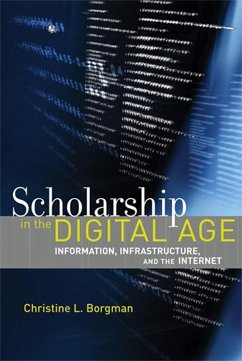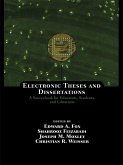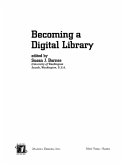An exploration of the technical, social, legal, and economic aspects of the scholarly infrastructure needed to support research activities in all fields in the twenty-first century.
Scholars in all fields now have access to an unprecedented wealth of online information, tools, and services. The Internet lies at the core of an information infrastructure for distributed, data-intensive, and collaborative research. Although much attention has been paid to the new technologies making this possible, from digitized books to sensor networks, it is the underlying social and policy changes that will have the most lasting effect on the scholarly enterprise. In Scholarship in the Digital Age, Christine Borgman explores the technical, social, legal, and economic aspects of the kind of infrastructure that we should be building for scholarly research in the twenty-first century.
Borgman describes the roles that information technology plays at every stage in the life cycle of a research project and contrasts these new capabilities with the relatively stable system of scholarly communication, which remains based on publishing in journals, books, and conference proceedings. No framework for the impending "data deluge” exists comparable to that for publishing. Analyzing scholarly practices in the sciences, social sciences, and humanities, Borgman compares each discipline's approach to infrastructure issues. In the process, she challenges the many stakeholders in the scholarly infrastructure—scholars, publishers, libraries, funding agencies, and others—to look beyond their own domains to address the interaction of technical, legal, economic, social, political, and disciplinary concerns. Scholarship in the Digital Age will provoke a stimulating conversation among all who depend on a rich and robust scholarly environment.
Scholars in all fields now have access to an unprecedented wealth of online information, tools, and services. The Internet lies at the core of an information infrastructure for distributed, data-intensive, and collaborative research. Although much attention has been paid to the new technologies making this possible, from digitized books to sensor networks, it is the underlying social and policy changes that will have the most lasting effect on the scholarly enterprise. In Scholarship in the Digital Age, Christine Borgman explores the technical, social, legal, and economic aspects of the kind of infrastructure that we should be building for scholarly research in the twenty-first century.
Borgman describes the roles that information technology plays at every stage in the life cycle of a research project and contrasts these new capabilities with the relatively stable system of scholarly communication, which remains based on publishing in journals, books, and conference proceedings. No framework for the impending "data deluge” exists comparable to that for publishing. Analyzing scholarly practices in the sciences, social sciences, and humanities, Borgman compares each discipline's approach to infrastructure issues. In the process, she challenges the many stakeholders in the scholarly infrastructure—scholars, publishers, libraries, funding agencies, and others—to look beyond their own domains to address the interaction of technical, legal, economic, social, political, and disciplinary concerns. Scholarship in the Digital Age will provoke a stimulating conversation among all who depend on a rich and robust scholarly environment.
Dieser Download kann aus rechtlichen Gründen nur mit Rechnungsadresse in A, B, BG, CY, CZ, D, DK, EW, E, FIN, F, GR, HR, H, IRL, I, LT, L, LR, M, NL, PL, P, R, S, SLO, SK ausgeliefert werden.









